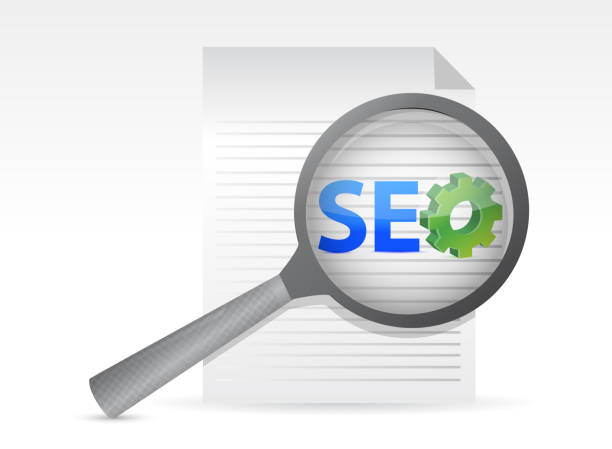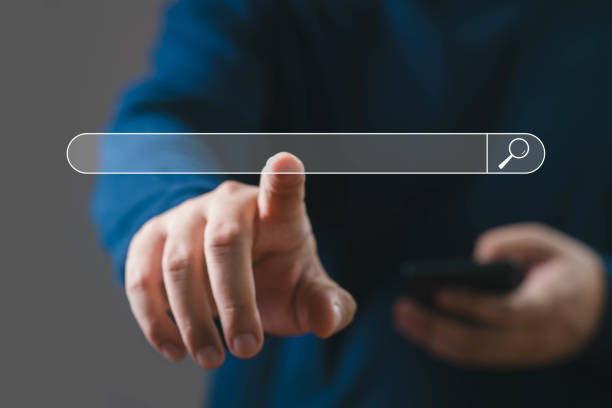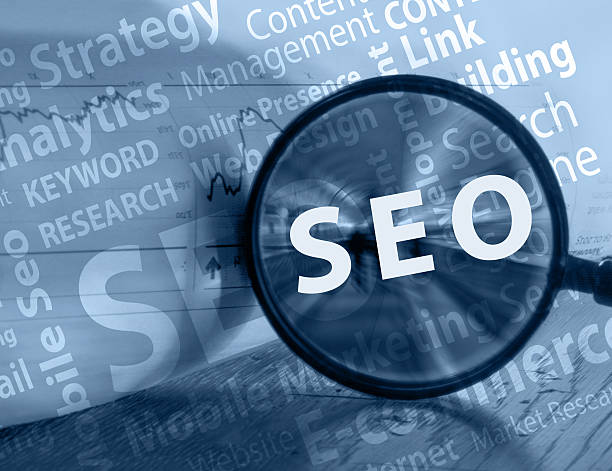Introduction to Off-Page SEO and its Unrivaled Importance

Off-Page SEO refers to a set of actions performed outside your website that directly impact its ranking and authority in search engines.
In today’s competitive world, merely having high-quality content and an optimized internal structure (On-Page SEO) is not enough.
To truly be seen, you need power and authority from external sources.
This is where the importance of #OffPageSEO becomes clear.
The main goal of #OffPageSEO is to increase Domain Authority and Page Authority in the eyes of search engines, especially Google.
This authority is gained through backlinks, social signals, and brand mentions.
In fact, Google considers websites that receive links from other reputable sources more trustworthy and useful, giving them a better ranking.
Without sufficient attention to this aspect of SEO, even the best content in the world might get lost among a multitude of competitors.
Therefore, a deep understanding of Off-Page SEO strategies is vital for any business seeking online success.
This section is explanatory and educational, providing the foundation for understanding the subsequent steps.
#EducationalContent
Is your online sales not meeting expectations? With RasaWeb, solve the problem of low sales and poor user experience forever!
✅ Increase visitor-to-customer conversion rates
✅ Create an enjoyable user experience and build customer trust
⚡ Act now to receive a free consultation!
Key Differences Between On-Page and Off-Page SEO

To comprehensively understand SEO, one must grasp the clear distinction between On-Page SEO and Off-Page SEO.
On-Page SEO refers to all activities performed within your website to improve its ranking.
This includes optimizing keywords, URL structure, title tags, meta descriptions, content, page load speed, and design responsiveness.
The goal of On-Page SEO is for search engines to easily understand your content and find it relevant to user searches.
In contrast, Off-Page SEO focuses on improving your website’s authority and reputation through external sources.
The primary and most important factor in Off-Page SEO is obtaining backlinks from reputable and relevant websites.
But this is not the whole story; social signals (likes, shares, comments on social networks), brand mentions, and even online directories also play a role in strengthening Off-Page SEO.
The main difference is that On-Page SEO is entirely within your control, while Off-Page SEO requires interaction with other websites and platforms and is, to some extent, beyond your direct control.
Both aspects are essential for a successful SEO strategy and complement each other; a website with strong On-Page SEO but weak Off-Page SEO, or vice versa, will never reach its full potential.
This analytical section helps clarify the concepts.
Backlinks and Their Types; The Backbone of Off-Page SEO

Backlinks or inbound links are the vital arteries of Off-Page SEO.
They are considered a vote of confidence from one website to another, and their quality and quantity have a profound impact on your site’s ranking in Google.
But not all backlinks are equal; quality prevails over quantity.
One backlink from a reputable and relevant website is worth far more than dozens of backlinks from low-authority and irrelevant sites.
There are different types of backlinks, each playing a specific role:
| Backlink Type | Description | Importance in Off-Page SEO |
|---|---|---|
| Natural Links | Links that are given naturally and without request, due to the high quality of the content. | Highest value, indicating true content authority. |
| Manual Links | Links obtained through activities such as guest blogging, directory submissions, or link exchanges. | Medium value, can be useful if of high quality. |
| Self-Created Links | Links you create yourself in comments, forums, or profiles. | Lowest value, can be harmful if overused. |
| Dofollow Links | Links that pass authority and “Link Juice” to the destination site. | Very important, directly impact rankings. |
| Nofollow Links | Links that tell search engines not to pass authority. | Less direct value but still important for traffic and link profile diversity. |
Understanding these differences and striving to acquire dofollow and natural links from reputable sources is the beating heart of your Off-Page SEO strategy.
This specialized and educational section provides you with key information.
Effective Link Building Strategies for Strengthening Off-Page SEO

Link Building is a conscious and strategic process of acquiring backlinks from other websites.
It is considered one of the most complex yet vital aspects of Off-Page SEO.
Building quality links not only increases your site’s authority but also brings you Referral Traffic.
Some of the most effective strategies include:
- Creating High-Quality Linkable Assets: Content that naturally encourages users and other websites to link to it.
This includes infographics, original research, free tools, or comprehensive and in-depth articles. - Guest Blogging: Writing articles for other websites in your industry and including a link back to your own site within that article.
This requires identifying relevant and high-quality sites. - Broken Link Building: Finding broken links on other websites and suggesting replacing them with your similar content.
- Skyscraper Technique: Finding popular content in your industry, creating a better and more comprehensive version of it, and then requesting links from those who linked to the original version.
- Digital PR: Using public relations techniques to attract the attention of media outlets, bloggers, and influencers, which can lead to acquiring natural links.
- Reputable Directories and Listings: Submitting your site to authoritative industry and local directories.
Using appropriate Anchor Text is also crucial in link building.
Anchor text is the text within which the link is placed, and it should be relevant to the destination page.
This guiding and specialized section provides practical strategies.
Did you know that customers’ first impression of your company is your website? With a powerful corporate site from RasaWeb, multiply your business’s credibility!
✅ Custom and eye-catching design tailored to your brand
✅ Improved user experience and increased customer acquisition
⚡ Get a free consultation!
White Hat and Black Hat Off-Page SEO; Ethics in Optimization

In the world of Off-Page SEO, like any other field, there are two main approaches: White Hat SEO and Black Hat SEO.
Understanding the difference between these two is crucial for maintaining your site’s ranking stability in the long term.
White Hat SEO refers to a set of ethical and search engine-approved techniques.
The goal of these techniques is to provide the best user experience and valuable content, which naturally leads to higher rankings.
In White Hat Off-Page SEO, the focus is on acquiring natural and quality backlinks from reputable and relevant websites.
This includes producing valuable content, guest blogging on relevant sites, digital public relations, and engaging on social media to increase brand awareness.
White Hat SEO results are typically slower to achieve but are stable and long-lasting, minimizing the risk of being penalized by Google.
In contrast, Black Hat SEO refers to methods designed to deceive search engine algorithms and achieve fast, unreasonable rankings.
These techniques typically violate Google’s guidelines and can lead to severe penalties, including complete removal of the site from search results.
In Black Hat Off-Page SEO, one might use large-scale backlink purchasing, building Private Blog Networks (PBNs), spamming comments or forums with irrelevant links, or using automated software for link generation.
Although results might be achieved in the short term, these results are unstable and carry very high risks.
This analytical section helps clarify ethical guidelines in SEO.
The Role of Social Signals and Social Bookmarking in Off-Page SEO

While backlinks are considered the primary factor in Off-Page SEO, the role of Social Signals and Social Bookmarking cannot be ignored.
Although Google has explicitly stated that social signals are not directly a ranking factor, their indirect influence on Off-Page SEO cannot be denied.
When your content is shared, liked, or discussed on social networks like Twitter, LinkedIn, Facebook, or Instagram, this can lead to increased brand awareness and ultimately attract more traffic and even natural backlinks.
Social Bookmarking also refers to platforms like Pinterest or social news sites like Reddit where users can save and share their favorite links.
Although many of these links are “nofollow” and do not directly pass authority to your site, they can serve as a source for content discovery by users and webmasters.
This discovery, in turn, may lead to natural dofollow links from reputable websites.
Furthermore, strong activity on social networks can aid in branding, which is a key aspect of modern Off-Page SEO.
The more recognized and reputable your brand, the more likely people are to trust and link to it.
This explanatory and specialized section delves into lesser-known aspects of Off-Page SEO.
Important Tools for Analyzing and Implementing Off-Page SEO

To succeed in the world of Off-Page SEO, having the right tools for competitor analysis, finding link-building opportunities, and monitoring your backlink profile is essential.
These tools provide you with deeper insights into your performance and help you implement better strategies.
| Tool Name | Description and Usage | Key Points |
|---|---|---|
| Ahrefs | One of the most powerful tools for backlink analysis, keyword research, and competitor analysis. Has a vast database of backlinks. |
Leader in backlink analysis; expensive but very comprehensive. |
| Semrush | A comprehensive SEO tool that includes backlink analysis, keyword research, competitor analysis, and technical SEO capabilities. | An all-in-one digital marketing tool; good for comprehensive analysis. |
| Moz Link Explorer | Moz’s tool for backlink analysis and measuring Domain Authority (DA) and Page Authority (PA). | Useful for measuring domain authority; has a limited free version. |
| Google Search Console | Google’s free tool for monitoring site performance in search results, including backlink reports. | Essential and free; accurate information directly from Google. |
| Google Analytics | Free tool for analyzing website traffic, user behavior, and traffic sources. | Useful for measuring the impact of Off-Page SEO on referral traffic. |
Intelligent use of these tools helps you plan and implement your Off-Page SEO strategies with greater precision and continuously monitor their performance.
This guiding and specialized section helps you identify the necessary tools.
Google Penalties and Ways to Combat Them in Off-Page SEO

Ignoring Google’s guidelines in the realm of Off-Page SEO can lead to severe penalties that drastically reduce your site’s ranking or even remove it entirely from search results.
Penalties can be manual (Manual Penalty), applied by a human reviewer at Google, or algorithmic (Algorithmic Penalty), applied by Google’s algorithm updates like Penguin.
The main reasons for penalties in Off-Page SEO include:
- Purchasing backlinks or participating in link schemes aimed at deceiving Google: This is one of the most common reasons for penalties.
- Spammy and low-quality backlinks: Links from worthless, irrelevant, or low-content sites.
- Over-optimized anchor texts: Repeated use of exact match keywords in anchor texts that appear unnatural.
- Private Blog Networks (PBNs): Using a network of fabricated websites to create backlinks.
If a penalty is received, the following actions are essential for rank recovery:
- Identify bad links: Use tools like Ahrefs, Semrush, or Google Search Console to identify toxic and low-quality backlinks.
- Attempt to remove links: Contact the webmasters of referring sites and request link removal.
- Google Disavow Tool: If link removal is not possible, use the Disavow Tool in Google Search Console to tell Google to disregard these links.
- Submit a Reconsideration Request: After cleaning up the link profile, submit a reconsideration request to Google explaining the actions you’ve taken for correction.
This news and guidance section helps you avoid potential dangers and, if necessary, provides a path to return to the correct course.
Did you know that 94% of users’ first impressions of a business are related to its website design? With professional corporate website design by **RasaWeb**, turn this initial impression into an opportunity for growth.
✅ Attract more customers and increase sales
✅ Build credibility and trust in the audience’s eyes⚡ Get a free website design consultation!
Measuring Success in Off-Page SEO and Key Metrics

After implementing Off-Page SEO strategies, the question is how to measure your success? Continuous measurement and monitoring are vital elements for ongoing optimization and improvement.
There are several key metrics you should track:
- Number and Quality of Backlinks: Monitor the number of new links as well as the quality (Domain Authority, Page Authority) of the sites you receive links from.
The goal is to increase quality links from reputable sites. - Diversity of Referring Domains: The number of unique domains that have linked to your site.
The greater this diversity, the more natural and stronger your link profile appears. - Referral Traffic: Traffic that comes to your website through clicks on backlinks from other sites.
This is a direct indicator of the effectiveness of links in attracting users. - Keyword Rankings: Observe improvement in the ranking of target keywords in search results.
Strong Off-Page SEO directly impacts these rankings. - Domain Authority (DA) and Page Authority (PA): These metrics, provided by Moz, indicate the overall strength and authority of the site and its specific pages.
An increase in these metrics indicates an improvement in Off-Page SEO. - Brand Mentions: Track where your brand name is mentioned, even if there isn’t a direct link.
This indicates an increase in brand awareness and reputation.
Using tools like Google Analytics, Google Search Console, Ahrefs, and Semrush is essential for collecting and analyzing this data.
By continuously monitoring these metrics, you can identify the strengths and weaknesses of your Off-Page SEO strategy and optimize them to achieve the best results.
This analytical and guiding section helps you understand the metrics for measuring success.
Controversial Content and Its Role in Improving Off-Page SEO

Controversial content refers to content that not only provides valuable information but also makes the audience think, sparks discussion, and may even challenge common perspectives.
This type of content, due to its engaging and stimulating nature, has high potential for attracting attention, shares, and ultimately, acquiring backlinks.
Indeed, one of the best ways to naturally improve Off-Page SEO is to produce content that people want to talk about and share with others.
Why is controversial content beneficial for Off-Page SEO?
- Increased Social Sharing: Controversial and engaging content naturally goes viral on social networks, leading to increased social signals and brand awareness.
- Natural Backlink Acquisition: Other websites and blogs tend to link to content that is new, unique, or challenging.
This type of content can act as a “linkable asset.” - Increased User Engagement: Controversial content typically generates more comments, discussions, and interaction on your website, which indicates content quality and attractiveness to search engines.
- Positioning as a Thought Leader: Producing content that introduces new perspectives can establish you as an authority and thought leader in your industry, which in turn helps attract more valuable links.
Of course, producing this type of content requires precision and in-depth research.
One should not publish inaccurate or offensive information merely for the sake of being controversial.
The goal should be to stimulate thought and healthy exchange of ideas, ultimately benefiting your users and website.
This section is controversial content and analytical, offering a different perspective on content creation.
Frequently Asked Questions
| Question | Answer |
|---|---|
| What is Off-Page SEO? | Off-Page SEO refers to a set of activities and methods performed outside your website to improve its ranking in search engines, such as building backlinks. |
| Why is Off-Page SEO important for a website? | Off-Page SEO shows search engines that your website is credible, popular, and trustworthy, which helps increase domain authority and ranking. |
| What is the most important factor in Off-Page SEO? | Backlinks, or links from other sites to your site, are the most important factor, especially if they are from reputable sites. |
| What are the characteristics of a quality backlink? | A quality backlink comes from reputable sites (with high authority), relevant to your site’s topic, and with appropriate (natural) anchor text. |
| Do social networks play a role in Off-Page SEO? | Yes, sharing content on social media can help increase visibility and indirect traffic, sending positive social signals to search engines. |
| What is PBN and is it recommended? | PBN (Private Blog Network) is a network of private websites used to build backlinks to the main site. Google considers this method as spam, and its use is strictly prohibited and can lead to penalties. |
| How is Natural Link Building done? | By producing valuable and shareable content, establishing relationships with bloggers and influencers, and attracting media attention. |
| What is Anchor Text in a backlink? | It is the text in which the link is placed. Using diverse and keyword-relevant anchor texts appears more natural and helps with SEO. |
| What is the connection between Local SEO and Off-Page SEO? | Local SEO includes off-site activities such as registering with Google My Business, local directories, and getting online reviews, which help businesses appear in local search results. |
| How can one analyze competitor backlinks? | By using tools like Ahrefs, Semrush, or Moz, you can analyze competitors’ backlink profiles and identify new link-building opportunities. |
And other services of Rasa Web Advertising Agency in the field of advertising
Smart Digital Advertising: An effective tool for online growth with the help of key page optimization.
Smart Website Development: A novel service for increasing online growth through Google Ads management.
Smart Brand Identity: Designed for businesses seeking to improve SEO rankings by utilizing real data.
Smart Google Ads: An effective tool for customer acquisition with the help of Google Ads management.
Smart Digital Advertising: A fast and efficient solution for online growth with a focus on custom programming.
And over hundreds of other services in the field of internet advertising, advertising consulting, and organizational solutions
Internet Advertising | Advertising Strategy | Advertorial
Resources
Everything about Off-Page SEO
What is Off-Page SEO?
Complete Guide to Off-Page SEO
Zero to Hundred Off-Page SEO
? Ready to revolutionize your business in the digital world? Rasaweb Afarin, with expertise in secure website design, professional SEO, and content marketing, paves your path to success and visibility. With us, secure the future of your online business.
📍 Tehran, Mirdamad Street, Next to Central Bank, Southern Kazeroun Alley, Ramin Alley No. 6




